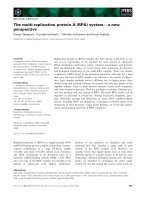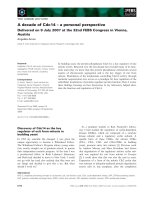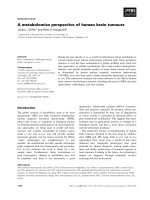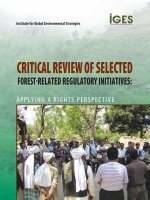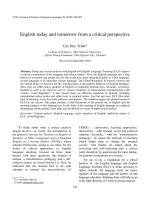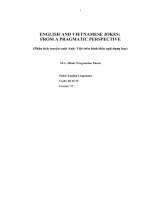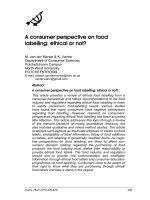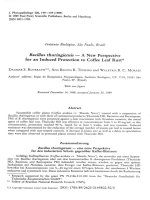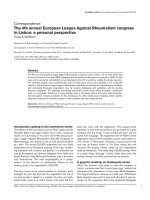Policing a multiracial society developing a minority perspective 2
Bạn đang xem bản rút gọn của tài liệu. Xem và tải ngay bản đầy đủ của tài liệu tại đây (126.98 KB, 7 trang )
120
Appendix A
Section 33 of the Criminal Procedure Code (CPC)
Refusal to give name and residence.
33. —(1) When any person in the presence of a police officer commits or is accused of
committing a non-seizable offence and refuses on the demand of a police officer to give
his name and residence or gives a name or residence which the officer has reason to
believe to be false, he may be arrested by that police officer in order that his name or
residence may be ascertained, and he shall, within 24 hours from the arrest exclusive of
the time necessary for the journey; be taken before the nearest Magistrate’s Court, unless
before that time his true name and residence are ascertained in which case he shall be
forthwith released on his executing a bond with or without sureties for his appearance
before a Magistrate’s Court, if so required.
(2) When any person is thus taken before a Magistrate’s Court, the Court may either
require him to execute a bond with or without a surety for his appearance before a
Magistrate’s Court if so required, or may order him to be detained in custody until he
can be tried.
Naming a residence outside Singapore.
(3) When any person in the presence of a police officer commits or is accused of
committing a non-seizable offence, and on the demand of a police officer to give his
name and residence gives as his residence a place not within Singapore, he may be
arrested by the police officer and shall be taken forthwith before the nearest Magistrate,
who may either require him to execute a bond with or without a surety for his
appearance before a Magistrate’s Court if so required, or may order him to be detained
in custody until he can be tried or shall be taken before a police officer not below the
rank of inspector who may require him to execute a bond with or without a surety for his
appearance before a Magistrate’s Court, if required.
Section 179 of the Penal Code
Refusing to answer a public servant authorised to question
179. Whoever, being legally bound to state the truth on any subject to any public
servant, refuses to answer any question demanded of him touching that subject by such
public servant, in the exercise of the legal powers of such public servant, shall be
punished with imprisonment for a term which may extend to 6 months, or with fine
which may extend to $3,000, or with both.
121
Appendix B
PARTICIPANT INFORMATION SHEET (PIS)
1. Study title
Ethnic Minorities and the Criminal Justice System (CJS) in Singapore
2. Principal Investigator and co-investigator(s) if any, with the contact
number and name of Department.
Mr Anil Singh Sona Tel.: 94593440
Department of Sociology, NUS
3. What is the purpose of this research?
This research focuses on the disproportionate representation of ethnic minorities
in the CJS in Singapore. It pays attention to the racial/ethnic dimension of the
CJS in the context of a multiracial society and police force in Singapore. I am
interested in the responses and experiences of (1) ethnic minorities towards their
encounters of policing practices and (2) ex-inmates’ experiences with the CJS.
“You are invited to participate in a research. This information sheet provides you
with information about the research. The Principal Investigator (the person in
charge of this research) or his/her representative will also describe this research
to you and answer all of your questions. Read the information below and ask
questions about anything you don’t understand before deciding whether or not to
take part in the study.”
“I will now read for you some important information about the study and you
will be able to ask me any questions about anything you don’t understand before
deciding whether or not to take part in the study”
4.
Who can participate in the research?
The participants who are 19 or more years of age and a mix of males and
females. They can be either gainfully employed (full- or part-time) or
unemployed. Current inmates are excluded from participating in this research.
5. What is the expected duration of my participation?
Each interview will last for about one to two hours
6. What is the duration of this research?
The duration of the project is about one and a half years
122
7. What is the approximate number of participants involved?
There will be a total of 30 participants.
8. What will be done if I take part in this research?
An interview, which will last for about one to two hours, will be conducted with
you. It will be based on your personal account and recollection of your responses
and experiences towards policing practices.
9. How will my privacy and the confidentiality of my research records be protected?
Please note that complete anonymity and confidentiality of information will be
maintained at all times. No personal identifiers such as IC number or name will
be collected from you. Nonetheless, upon data collection, the data will be stored
under lock and key and only the researcher involved in the study whose name is
reflected on the front page will have access to the data. The data will eventually
be destroyed upon completion of the research.
10. What are the possible discomforts and risks for participants?
As the participation is voluntary, there is no anticipated discomfort and risk.
However, you may choose not to answer any question that you are
uncomfortable with.
11. What is the compensation for any injury?
No injury or compensation is expected. The methodology is one which is based
on face-to-face interviews.
12. Will there be reimbursement for participation?
There will be no reimbursement for participating in the study.
13. What are the possible benefits to me and others?
There is no direct benefit to you by participating in this research. The knowledge
gained will benefit the public in the future. It is important to record the responses
and experiences of ethnic minorities towards policing, for the benefit of the
general ethnic minority communities as well as future researchers.
14. Can I refuse to participate in this research?
Yes, you can. Your decision to participate in this research is voluntary and
completely up to you. You can also withdraw from the research at any time
without giving any reasons by informing the principal investigator. All you data
will be discarded subsequently.
123
15. Whom should I call if I have any questions or problems?
You may contact the Principal Investigator (PI) at telephone 94593440 or email
at
For an independent opinion regarding the research and the right of research
participants, you may contact a staff member of the National University of
Singapore Institutional Review Board (Attn: Mr Chan Tuck Wai, at telephone
65161234 or email at )
INFORMED CONSENT FORM
I hereby acknowledge that:
1. I have agreed to take part in the above research.
2. I have received a pamphlet (or a copy of this information sheet) that explains
the objectives and nature of this research. I understand its contents and
agree to participate in this research.
3. I can withdraw from the research at any point of time by informing the
Principal Investigator and all my data (and samples if any) will be discarded.
4. I will not have any rights to any commercial benefits that result from this
research.
5. I also agree that I will not derive any monetary or other benefits from this
research.
124
Appendix C
PARTICIPANT INFORMATION SHEET (PIS)
1.
Study title
Ethnic Minorities and the Criminal Justice System (CJS) in Singapore
2.
Principal Investigator and co-investigator(s) if any, with the contact
number and name of Department.
Mr Anil Singh Sona Tel.: 94593440
Department of Sociology, NUS
3.
What is the purpose of this research?
This research focuses on the disproportionate representation of ethnic minorities
in the CJS in Singapore. It pays attention to the racial/ethnic dimension of the
CJS in the context of a multiracial society and police force in Singapore. I am
interested in the responses and experiences of (1) ethnic minorities towards their
encounters of policing practices and (2) ex-inmates’ experiences with the CJS.
“You are invited to participate in a research. This information sheet provides you
with information about the research. The Principal Investigator (the person in
charge of this research) or his/her representative will also describe this research
to you and answer all of your questions. Read the information below and ask
questions about anything you don’t understand before deciding whether or not to
take part in the study.”
“I will now read for you some important information about the study and you
will be able to ask me any questions about anything you don’t understand before
deciding whether or not to take part in the study”
4.
Who can participate in the research?
The participants who are 19 or more years of age and a mix of males and
females. They can be either gainfully employed (full- or part-time) or
unemployed. Current inmates are excluded from participating in this research.
5.
What is the expected duration of my participation?
Each interview will last for about one to two hours
6.
What is the duration of this research?
The duration of the project is about one and a half years
125
7.
What is the approximate number of participants involved?
There will be a total of 30 participants.
8.
What will be done if I take part in this research?
An interview, which will last for about one to two hours, will be conducted with
you. It will be based on your personal account and recollection of your responses
and experiences towards policing practices.
9.
How will my privacy and the confidentiality of my research records be
protected?
Please note that complete anonymity and confidentiality of information will be
maintained at all times. No personal identifiers such as IC number or name will
be collected from you. Nonetheless, upon data collection, the data will be stored
under lock and key and only the researcher involved in the study whose name is
reflected on the front page will have access to the data. The data will eventually
be destroyed upon completion of the research.
10.
What are the possible discomforts and risks for participants?
As the participation is voluntary, there is no anticipated discomfort and risk.
However, you may choose not to answer any question that you are
uncomfortable with.
11.
What is the compensation for any injury?
No injury or compensation is expected. The methodology is one which is based
on face-to-face interviews.
12.
Will there be reimbursement for participation?
There will be no reimbursement for participating in the study.
13.
What are the possible benefits to me and others?
There is no direct benefit to you by participating in this research. The knowledge
gained will benefit the public in the future. It is important to record the responses
and experiences of ethnic minorities towards policing, for the benefit of the
general ethnic minority communities as well as future researchers.
14.
Can I refuse to participate in this research?
Yes, you can. Your decision to participate in this research is voluntary and
completely up to you. You can also withdraw from the research at any time
without giving any reasons by informing the principal investigator. All you data
will be discarded subsequently.
126
15.
Whom should I call if I have any questions or problems?
You may contact the Principal Investigator (PI) at telephone 94593440 or email
at
For an independent opinion regarding the research and the right of research
participants, you may contact a staff member of the National University of
Singapore Institutional Review Board (Attn: Mr Chan Tuck Wai, at telephone
65161234 or email at )
INFORMED CONSENT FORM (FOR EX-INMATES)
I hereby acknowledge that:
1. I have agreed to take part in the above research.
2. I have received a pamphlet (or a copy of this information sheet) that explains
the objectives and nature of this research. I understand its contents and
agree to participate in this research.
3. I can withdraw from the research at any point of time by informing the
Principal Investigator and all my data (and samples if any) will be discarded.
4. I will not have any rights to any commercial benefits that result from this
research.
5. I also agree that I will not derive any monetary or other benefits from this
research.
6. Upon the completion of this study, I will be provided with the parts of the
thesis that I have made contributions and I will be given the opportunity to
verify any information that is documented. If I feel that my identity has been
compromised, steps will be taken by the researcher to rectify through
omission.
7. I am aware that this thesis will not be published and my identity or any other
personal details (including my status as an ‘ex-inmate’) will be kept strictly
confidential.
8. I am aware that in the data collection process of my incarceration
experiences, there will be no mention of the names and details of (1) the land
division and authorities who were involved in the investigation of my
offence(s); (2) court procedures; (3) the institution(s) where I served my
sentence; (4) the duration of my sentence; and (5) the date of my sentence
and release. This is to ensure the anonymity of my identity and any other
personal details.
